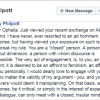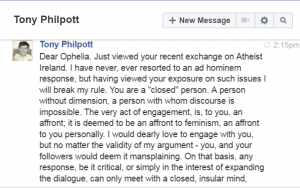Guest post by iknklast.
I have just recently come back from an annual play festival that I’ve attended several times before. I have always enjoyed this festival; it gives me a chance to interact with other playwrights, to attend workshops, and to see new plays that are in the process of development. The coordinators choose the plays from a large pool of submitted work. This year, there were 680 plays submitted, and only 30 were selected. These plays are then given a reading by trained actors, chosen and directed by a trained director, to allow them to hear their works and engage in a conversation about the strengths and weaknesses of the work. Although this is not in one of the most cosmopolitan cities, it is a very large, popular festival that attracts international submissions. I arrived eagerly. I left depressed.
The playwrights selected this year were mostly young, for the most part under thirty, though there were a few older faces, as well. The plays were in a variety of styles, from realist to totally abstract. There was one thing they had in common, though. Women. No, not plays about women, or for women, but plays that treated women as objects, stereotyped women, or otherwise viewed women in a way that screams of anti-woman culture. The worst of it is that most of these playwrights, and the theatre professionals who selected the plays, apparently did not realize that these plays were so…anti-woman. These ideas have become so normalized in our culture that even people who consider themselves liberal feminists were unable to notice.
The best of them (in terms of women) had women in major, strong, independent roles. So strong, in fact, that in this play, written by a woman, it was considered okay for one woman to call another woman a cunt. Several times. And please do not say anything to me about England. This play was set in Washington state. It was written by someone born and raised in the United States. It is not just the obliviousness of a culture that thinks its okay to insult someone by calling them a part of a woman’s anatomy as long as it is men that you are calling that; no, this is an American woman, calling another woman something designed to denigrate her by pointing out that she has the anatomy (or is the anatomy?) of a woman.
It was all downhill from there. There was the play in which two different characters engaged in slut shaming, telling the third character that she shouldn’t go out in the blouse of her choice because she would “cause” something bad to happen. It wouldn’t happen because the person doing it to her was bad; no, it would happen because a woman chose to wear the wrong clothes, clothes that were fun and attractive and made her feel happy. Since this entire play centered around two women going to meet a man, and they talked about little besides men, I’m not sure in the end it made the play any more sexist. Once again, written by a woman.
Two plays dealt with surrogacy. Neither of these plays questioned the wisdom or ethics of using another woman’s body as an incubator. As long as they were paying for the service, it was perfectly fine to put a woman through a difficult ordeal that lasts for nine months and can be life threatening. Even if it doesn’t lead to death (and most pregnancies don’t anymore, thank goodness), it changes her entire existence at least for that nine months, leaving her feeling sick and altering her activities for the benefit of someone else. One of the plays actually showed some impact on the surrogate, but never quite managed to question whether there was something wrong with using a woman’s body in this manner. The other one didn’t even do that. This was a play about two young men in a same sex relationship who discussed the mother of the child they were adopting as though she were just another appliance, except when they were talking trash about her and her life choices. The entire play was centered around the upheavals and changes that would occur in the lives of the two young men when that child entered their life; no one thought about the changes that were happening in the young woman’s life, and whether she would be okay, except as an afterthought when they happened to run into her at the bus stop while taking the baby home. She was leaving town.
Or the play about the two women who spent the entire play worrying about a man, the brother of one, the boyfriend of another. Oh, yes, that was based on Dostoyevsky, right? So you had to stick with his story, right? No, not really. This was a story about that story, but modernized, set in the 21st century where women are not required to think only about men.
One of the plays said it was going to examine the focus on being pretty and whether what we would do to maintain that was worth it. That sounded promising, until I saw the play, and realized that the character in the play who was beautiful beyond the others was the one who was also considered to have the highest worth. This was not questioned. It was just assumed that she was more valuable not only to her parents, but to the town, to the world, and even, in this magical realism play, to the universe. The girl who tried to save the other girl’s life at the cost of her own, who was also smart and a reader, was considered of extremely low value, even after the heroic act. Everything, from beginning to end, proclaimed the value of the pretty girl.
They did, however, save the “best” for last. This was a play about menopause. And in case you should miss that in the action, the title made sure you knew that. It was written by a young man. It portrayed menopause as a crazy time, a time when a woman was so unable to function as a person that she lost track of where she was most of the time, even losing whole days and whole conversations with people, until she finally turned into a different person altogether. Menopause is presented as mental illness so severe that the women is unable to function, and must be let go by her job because she cannot perform her duties properly. The implications of this are horrendous. We are told that a woman is less valuable during her youth because she might take off at any time to have a baby; and, of course, monthly cramps keep her from doing her work properly for a week, plus the PMS for a week before and a week after which render her basically insane, at least in the popular imagination. Then there is the need for frequent absences to take care of the kids. So, women, if you are past child bearing age, if you are nearing menopause and you thought you didn’t have to worry anymore about your value being questioned, this play comes along to point out that it is really going badly from here. You’ve managed somehow, in spite of yourself, to hold on to that job by the skin of your teeth, in spite of all those crazy days, months of absence from work each year, skipping work to take the kid to the dentist or to dance lessons, and you’ve just settled down to finally be the competent employee your male counterparts have always been. Now, watch out! Here comes menopause, making you even less competent than before! We have it on great authority – a young man. As a woman currently experiencing menopause, I stop and wonder – am I doing it wrong? A bit of a hot flash now and then? No real impairment of my functioning? I remember all those articles I’ve read explaining how menopause really isn’t that big a deal for most women. Some women really have a rough time, but most women come through it without too much horrible disruption. Like most of the other things we supposedly have going on that keep us from functioning, it is quite overhyped. But…then…this play? Oh, well, artistic license. It makes a great story, right? After all, a woman doing what women usually do without much change isn’t really theatrical, so we must take the most dramatic, and then increase the drama several notches. Because it is absolutely necessary to write a play about a woman in menopause, right? Why? Who knows? But you can’t show a woman going through menopause like women go through menopause, because, let’s face it, that’s boring. It’s like ordinary life or something.
Now, I am not saying that authors should not be entitled to write the plays they want to write, or put out the ideas they believe. I am not saying the coordinators should not be entitled to select the plays they want to select. What I’m bothered by is the complete obliviousness on the part of not only the coordinators but the audience, an educated liberal audience that included many women, that these plays were sexist. They didn’t even notice. This is how normalized this sort of thing is in our society. Women have particular roles that are accepted as true. No matter if it really isn’t true, we all know this is how women are. In fact, I have a problem with one person in my own playwriting group who is unable to believe any of the women characters written by the women in the group. Why? Because we write the women we know – strong, independent women who do not waste our lives swooning, crying, or fussing over men. We write women who do things women can do, and don’t feel the need to reach into the bag of stereotypes to make sure our women are acceptable to the males in our group. Oh, wait, not stereotype. That’s archetype – the word that is preferred by people writing stereotypes because it sounds much less obnoxious. But the young women at this conference felt the need to reach into that bag and pull out whatever was handy. The young men were even freer with that; any pretenses at strong independent women were gone. If women showed up in the male-written plays at all, they were women who were unable to do much else besides get pregnant and go crazy.
Theatre people are notorious for being liberals, and for being social justice warriors. This is what they come up with. Is it any wonder that we are seeing the nastiness in so many other, less socially conscious walks of life?




